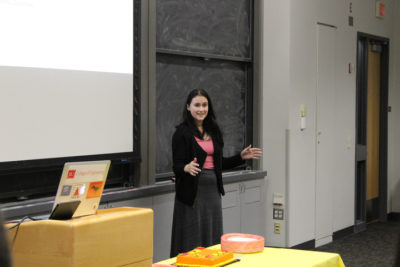
Student Government confirmed a slew of standing committee and cabinet committee chairs at their meeting Monday night.
All elected senators were present, having just finished the last of the remaining elections, including those from the College of Communication and Sargent College of Health and Rehabilitation Sciences.
SG President SaraAnn Kurkul opened the meeting with her weekly address. Kurkul told the assembled senators and cabinet members that SG has a strong mission for the year ahead.
“We are heading toward stability and creating a long-lasting legacy, and looking to build community and foster transparency,” she said.
Senators voted to confirm the chairs of two of Senate’s standing committees — the Mental Health Committee and 16,000 Strong.
Lul Mohamud, who was unanimously confirmed as chair of 16,000 Strong, said the committee’s mission is to educate, empower and unite BU students against sexual assault.
“A lot of people believe [sexual assault] doesn’t have anything to do with them, and that silence is what perpetuates rape culture and assault against women, men and those in between,” the junior in the College of Arts and Sciences said during the meeting.
After the meeting was over, Mohamud expressed her appreciation for the support SG provides to her committee.
“I’m very glad that we can continue doing what we’re doing, and we’re just excited that we do have support in the student government, and that they believe in our mission as much as we do,” Mohamud said after the meeting.
In addition to the standing committee chair confirmations, the Senate also confirmed the chairs for six cabinet committees — including the Department of Environmental Affairs, Department of Communications, Department of City Affairs, Finance Department, Department of Social Advocacy and Executive Advisory.
Benjamin Zabel, who Senate confirmed in a unanimous vote as director of the Department of Communications, said that his committee serves as a liaison between the other committees and BU’s administration.
Zabel said he hopes to reach out other student governments from other Boston-area colleges such as Northeastern University and Harvard University.
“Once we form [those relationships], we want to be in better contact with City Hall, the governor’s office, the mayor’s office, trying to get some good things started for BU and all of the university students in Boston because there’s so many of them,” the CAS junior said after the meeting.
At the end of the meeting, Senate Chair Octavio Vidal introduced a platform for senators to interact with their constituents called Student Group Outreach, which would involve sending senators to student groups.
“I really want to find a way to increase [Senate’s] advocacy because, in the past, there hasn’t been any set way that senators go out and meet students and reach out to them,” Vidal said. “I think that’s a huge problem for a group that claims to represent the student body.”
SG Vice President Piergiacomo Cacciamani said that while not all committee chairs were confirmed yet, he feels confident about the direction SG is taking this semester.
“The new chairs [that are] coming in are great because it means our outreach effort was actually successful,” Cacciamani said. “There are new people, but they are experienced. They know what they’re doing.”
Several SG participants said they were excited about the committee and cabinet confirmations.
College of General Studies senator freshman Samira Saran said she thought the committee chairs explained their platforms well during the meeting.
“We got a pretty good idea from those we were confirming of what their general plans were throughout the year, and I think when necessary, we did manage to ask questions that a lot of us did have, so it was a pretty clear, straightforward process,” Saran said.
Chance Rogala, a sophomore in the Arvind and Chandan Nandlal Kilachand Honors College who pitched his proposal as director of the Social Advocacy Committee, said he hopes to make progress with the issue this semester.
“I’ve been hoping it will spark some discussions about social advocacy,” Rogala said. “That’s something I feel often kind of gets pushed aside, especially with those actually trying to commit change.”
Rogala said that from his perspective, Senate proposals last year did not lead to substantive change.
“I feel like the executive board has solid ideas for a goal [this year] … They’re communicating a lot more, and I feel like that’s going to be helpful for this upcoming year.”
Charlie Emhardt, a Questrom School of Business senator, said he thought the student group outreach discussed at the end of the meeting was crucial for student government going forward.
“We can’t wait for the people to come to us,” the freshman said. “We definitely have to get aggressive and get in there and get involved with the student body, and that’s what we’re here for.”
Isabel Owens contributed to the reporting of this article.
Shaun was the Editor-in-Chief for the Spring 2019 semester. Before that, he was the Multimedia Editor, the Layout Editor and a News writer. He also sat on the Board of Directors. Follow him on Twitter @shaun_robs.




